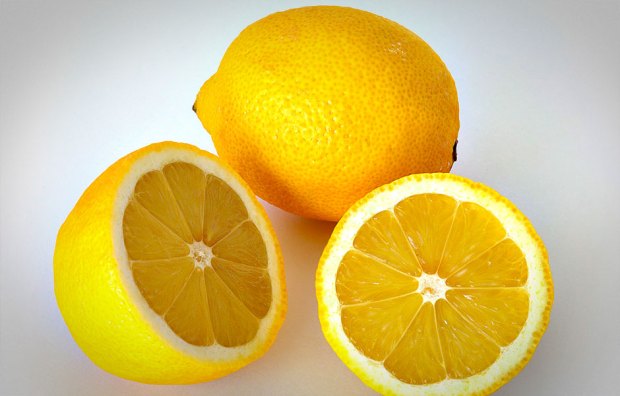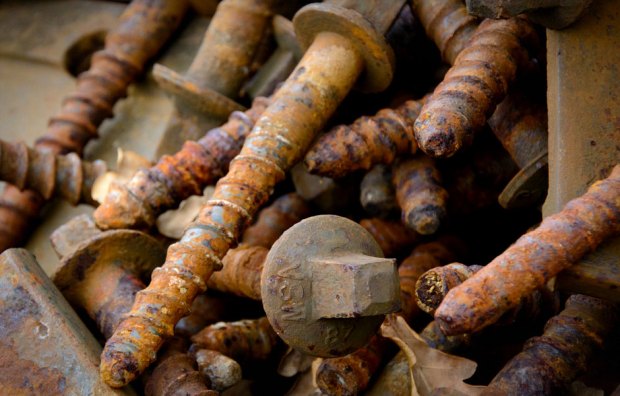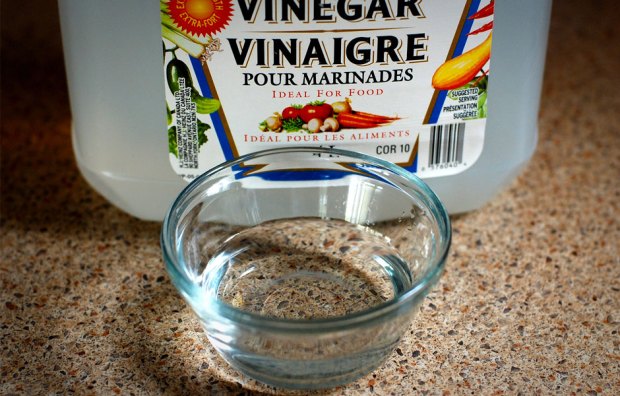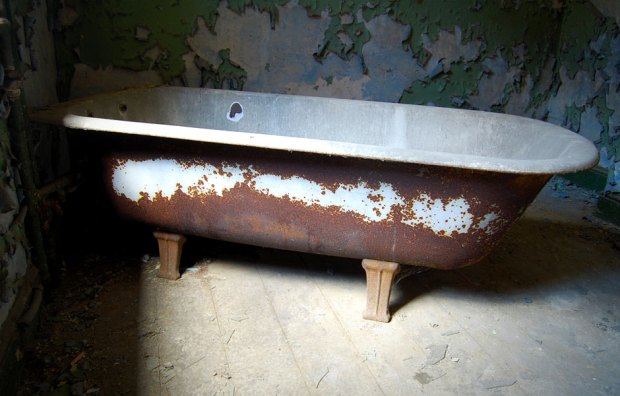Rust is a fact of life. With so much metal, water, and oxygen floating around, there’s no way you’ll skate through 80-odd years unscathed by the rust brigade. Chances are, you have a tool in your garage right now that has been rusted out of commission. Or maybe you have a fancy knife you left too long in the sink and it’s once shining appearance is marred by rust spots. Or maybe, you bumped up against an old metal fence after a rain and somehow your new button-up has been stained orange and brown. Whatever the reason, rust comes to us all in one way or another. In order to keep you, your tools, your clothes, and your bathroom rust free, we scoured the internet and old homemaking books to gather together this guide to teach you how to remove rust stains quickly, easily, and cheaply.
Related: How to Remove Sweat Stains from Dress Shirts
Cloth & Fabric

Removing rust stains from cloth or clothing is easier than you might think, but the key to removing rust without damaging the fabric is to be gentle. Treat your stain like you would a toddler or a luxury watch — with care.
- Soak the stained area with lemon juice. If you’re worried about fabric discoloration, first spot-test the lemon juice on an inconspicuous area of the fabric.
- Leave the lemon juice to soak for 5-10 minutes, allowing the citric acid in the juice to do it’s work dissolving and lifting the rust particles.
- Blot (don’t rub) with a soft, clean cloth.
- Rinse with cool water.
- If, on the first try, this doesn’t remove the stain completely, repeat.
- If the stain is extremely stubborn, add table salt after applying the lemon juice, allowing both to soak in.
- Once you’re satisfied that the rust has been removed, wash the fabric as you normally would.
This method works best on fabrics such as cotton, linen, acrylic, and polyester. Other fabrics such as rayon, silk, wool, leather, and suede should be taken to and treated by a professional dry-cleaner.
Do NOT use bleach on any rust stain. It will only make the stain worse at best, and permanent at worst.
Metal

Rusty metal is extremely common and, perhaps for that very reason, is the type of rust least likely to be dealt with. I personally have tossed out tools, nuts, and bolts that have rusted without a second thought. I should have had that second-thought though, because removing rust from metal is so simple a child could do it.
- Soak the rusted metal object in white vinegar for up to 24 hours, allowing the vinegar to work its magic.
- Scrub with a bristle brush, steel wool, or balled up aluminium foil to remove the remaining rusty crust.
- Rinse with cool water and dry.
- If white vinegar doesn’t do the trick, try the same process with oxalic acid (which can be bought at any home-supply store) and remember to rinse well. Do not smoke or directly inhale the fumes of oxalic acid. Your lungs will thank you.
Other Methods
Potato and Dish Soap
- Cut a potato in half and coat the inside in dish soap.
- Use the potato to scrub the rust away.
- For stubborn rust, leave the potato to rest for up to several hours on the rusted area.
- Scrub away remaining rust and rinse with cool water.
- Repeat if necessary.
Lemon and Salt
- Much like with fabric, cut a lemon in half and add salt to the flesh.
- Place the lemon on the rusty metal and, as above, and allow to sit for several hours.
- Use the rind of the lemon as a scrubber to remove the rust.
- Rinse.
- Repeat if necessary.
For Stainless Steel
- File the rust spots down with the finest emery paper or emery board you can find.
- Rub the filed area with an onion.
- Rinse with cool water and dry.
- Repeat as needed.
Concrete

Much like how your face is the first thing people notice when they meet you, so is your driveway to visitors and guests. A rusted up slab of concrete is not the best first impression. Eliminate these outdoor eyesores with the following methods for removing rust stains from concrete.
- Clean the stained area with soap and water.
- Rinse thoroughly.
- Apply either white vinegar or lemon juice to the affected area.
- Let the liquids do their work for 5-10 minutes.
- Scrub the stain with a soft bristled brush (if your concrete is smooth) or a wire brush (if the texture is rough).
- Repeat as often as needed to remove stain completely. It is common to need more than one pass to totally eliminate the stain.
For vertical or angled concrete, simply use a spray bottle to adequately coat the rusted surfaces.
For extremely tough stains, look to oxalic acid or trisodium phosphate, both of which can be found at hardware stores. These chemicals are corrosive and damaging to the skin and eyes, so be sure to follow the directions and wear protective gear. No one wants to have a clean driveway they can’t see because they’ve burned their corneas out.
Porcelain & Ceramic

We’ve all seen it. The nasty reddish-brown coating sitting just below the water of a long-neglected toilet bowl or the unsightly rust ring on the edge of a porcelain sink or bathtub. While no hazard to your health, the rust stains in these parts of the home just make you feel dirty. So, roll-up your sleeves and get out your elbow grease, because removing rust stains manually is a key component in the two best methods for removing rust on anything porcelain.
Pumic Stone
- Get a pumice stone.
- Rub the pumice stone on stained areas, working up a paste with the pumice.
- Rinse clean.
Or…
Lemon Juice and Borax
- Make a thick paste out of lemon juice and Borax (which can be bought at any local grocery or hardware store).
- Apply the paste the rust stained area and let sit for a couple of hours.
- Once the past has had some time to do its work, scrub the paste-coated area with a pumice stone.
- Rinse clean and flush that rust away.
These methods only work on porcelain or ceramic tubs, sinks, toilets, and tiles. Do not attempt this method on fiberglass bathtubs as the pumice stone will easy scratch the surface.
Image Credits: chain image courtesy user cortixxx via pixabay; bathtub courtesy David Locke via Flickr; white vinegar image courtesy Evitaochel via pixabay; lemon image via wikimedia commons.


